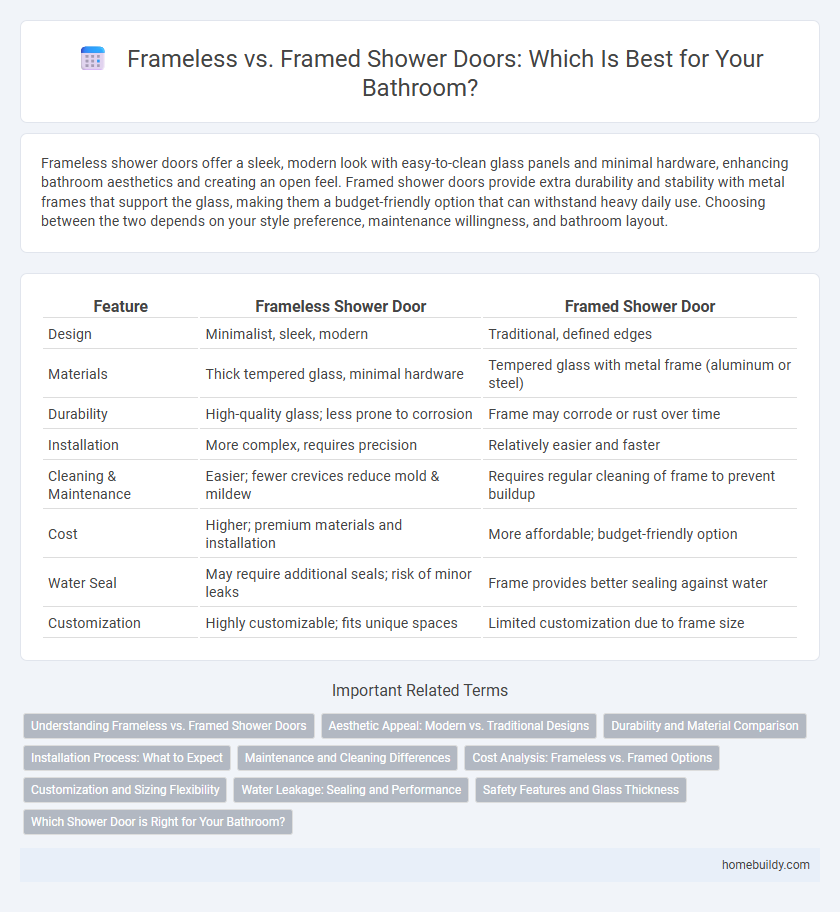Frameless shower doors offer a sleek, modern look with easy-to-clean glass panels and minimal hardware, enhancing bathroom aesthetics and creating an open feel. Framed shower doors provide extra durability and stability with metal frames that support the glass, making them a budget-friendly option that can withstand heavy daily use. Choosing between the two depends on your style preference, maintenance willingness, and bathroom layout.
Table of Comparison
| Feature | Frameless Shower Door | Framed Shower Door |
|---|---|---|
| Design | Minimalist, sleek, modern | Traditional, defined edges |
| Materials | Thick tempered glass, minimal hardware | Tempered glass with metal frame (aluminum or steel) |
| Durability | High-quality glass; less prone to corrosion | Frame may corrode or rust over time |
| Installation | More complex, requires precision | Relatively easier and faster |
| Cleaning & Maintenance | Easier; fewer crevices reduce mold & mildew | Requires regular cleaning of frame to prevent buildup |
| Cost | Higher; premium materials and installation | More affordable; budget-friendly option |
| Water Seal | May require additional seals; risk of minor leaks | Frame provides better sealing against water |
| Customization | Highly customizable; fits unique spaces | Limited customization due to frame size |
Understanding Frameless vs. Framed Shower Doors
Frameless shower doors use thick tempered glass without a metal frame, offering a sleek, modern look and easier cleaning due to fewer nooks for mold and grime. Framed shower doors feature aluminum or metal frames that provide added structural support and are generally more affordable and easier to install, making them a practical choice for tight budgets. Understanding the differences in durability, maintenance, and aesthetics helps homeowners select the best option for their bathroom design and functionality needs.
Aesthetic Appeal: Modern vs. Traditional Designs
Frameless shower doors offer a sleek, modern aesthetic characterized by clean lines and minimal hardware, enhancing bathroom spaciousness and contemporary appeal. Framed shower doors feature visible metal edges and classic designs that complement traditional or transitional bathroom styles with added structure. Choosing between frameless and framed options depends largely on preferred design style, with frameless doors favored for modern, minimalist spaces and framed doors aligning with more conventional aesthetics.
Durability and Material Comparison
Frameless shower doors use thicker tempered glass, typically 3/8 to 1/2 inch, offering enhanced durability without relying on metal frames that can corrode over time. Framed shower doors incorporate aluminum or steel frames that provide structural support but may be prone to rust and water damage in humid bathroom environments. Tempered glass in frameless designs resists chipping and cracking better than the thinner glass commonly used in framed doors, ensuring long-lasting performance.
Installation Process: What to Expect
Frameless shower doors require precise measurements and professional installation due to the need for secure wall mounting and custom fitting, often involving heavy glass panels and specialized hardware. Framed shower doors typically offer a simpler DIY installation with pre-assembled frames that provide structural support and easier alignment, reducing installation time and complexity. Preparation for a frameless door installation includes checking wall plumbness and ensuring perfect door alignment, while framed doors are more forgiving of imperfections in wall shape and position.
Maintenance and Cleaning Differences
Frameless shower doors feature minimal hardware and smooth glass surfaces, making them easier to clean and less prone to mold and grime buildup compared to framed shower doors. Framed shower doors have metal tracks and frames that can accumulate soap scum and require regular scrubbing and maintenance to prevent corrosion and mold growth. The sealed edges of frameless doors reduce water leakage, decreasing the frequency of maintenance needed to keep the shower area dry and mold-free.
Cost Analysis: Frameless vs. Framed Options
Frameless shower doors typically cost between $700 and $1,200 due to higher-grade tempered glass and custom fittings, while framed options range from $200 to $600, benefiting from standardized aluminum frames and simpler installation. Maintenance and replacement costs also favor framed doors, as damaged frames or glass panels are generally less expensive to repair or replace than the thick, heavy glass of frameless designs. Budget-conscious homeowners often weigh these cost differences against aesthetic preferences and long-term durability when selecting shower door frames.
Customization and Sizing Flexibility
Frameless shower doors offer superior customization and sizing flexibility, allowing for tailored dimensions that fit unique bathroom layouts without the constraints of pre-set frame sizes. In contrast, framed shower doors come with fixed frame components, limiting adaptability to specific measurements and design preferences. This makes frameless options ideal for maximizing space and achieving a sleek, modern aesthetic in irregular or compact bathrooms.
Water Leakage: Sealing and Performance
Frameless shower doors utilize high-quality silicone seals and magnetic strips to minimize water leakage by creating tight, flexible barriers that adapt to door movement. Framed shower doors rely on metal frameworks and rubber gaskets, which may degrade over time and potentially allow water to seep through joints and corners. Proper installation and maintenance of sealing components are critical in both designs to ensure optimal water containment and prevent bathroom water damage.
Safety Features and Glass Thickness
Frameless shower doors use thicker tempered glass, often ranging from 3/8 to 1/2 inch, enhancing durability and safety by reducing the risk of breakage. Framed shower doors typically use thinner glass, around 1/4 inch, supported by metal frames that provide extra structural stability but can collect water and mold. Safety features in frameless designs rely heavily on the glass strength and high-quality hinges, while framed doors benefit from reinforced frame edges that prevent chipping and accidental impacts.
Which Shower Door is Right for Your Bathroom?
Frameless shower doors offer a sleek, modern appearance with minimal hardware, making them ideal for contemporary bathrooms seeking a spacious and open feel. Framed shower doors provide enhanced durability and water containment, better suited for high-traffic bathrooms or those with budget constraints. Choosing the right shower door depends on your bathroom's style, maintenance preferences, and budget considerations.
Frameless shower door vs framed shower door Infographic

 homebuildy.com
homebuildy.com